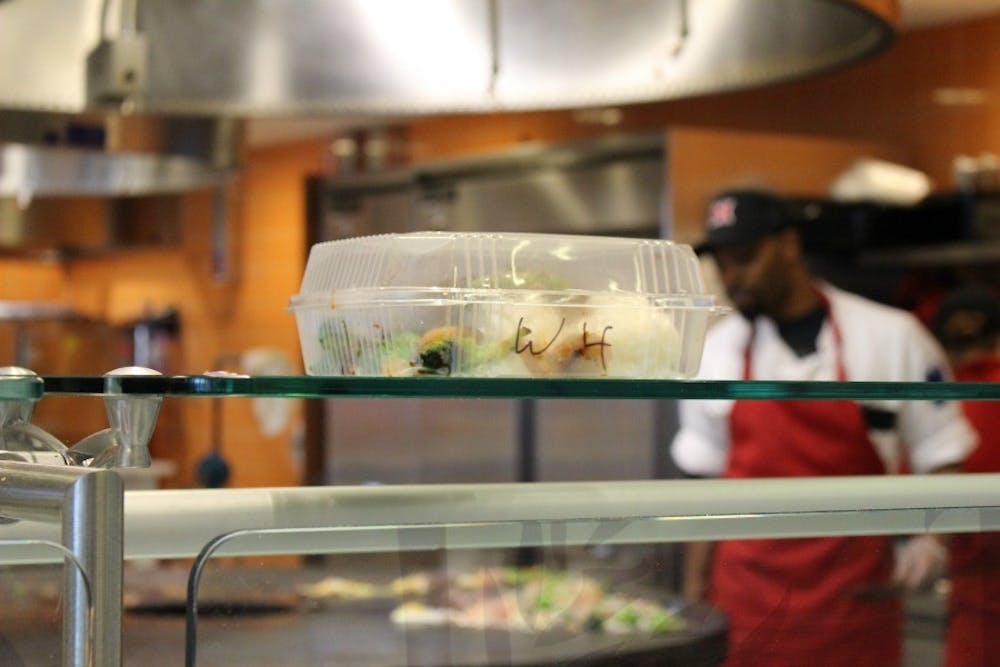By Paris Franz, For The Miami Student
During the second week of March, the brown cardboard boxes used for takeout orders in campus dining halls were replaced by clear plastic containers, a recyclable alternative.
According to Jon Brubacher, interim director of dining services, Miami's Oxford campus was going through about 45,000 of the brown cardboard boxes, sold under the name of Revive Brown Bio-box 3, per month - making the switch to recyclable containers key to being more environmentally friendly.
"They're paper and they're called bio-boxes. Originally, we thought they were sustainable, but those containers were not being recycled at all," said Brubacher. "[By] switching to a plastic container, at least [we ensure that] all of [the containers] that make it into a recycling container do get recycled."
When the Oxford campus first began using the brown boxes about 10 years ago, the intention was to compost them, said Yvette Kline, director of sustainability and energy conservation. A local composting company confirmed that the brown box, which is made out of 100 percent recycled cardboard, was compostable. However, within a year, all three compost facilities local to Oxford went out of business.
The compost operations were then subcontracted out to a company based in Delaware, Ohio, increasing the cost of composting.
Meanwhile, Miami had been making efforts on its Oxford campus to increase the amount of brown boxes being included in the composting stream. Miami approached the brown box supplier and asked for the boxes to be visibly marked as compostable. The supplier informed Miami that the boxes did not meet commercial compost standards.
"Our jaws dropped at that point," Kline said. "The whole compost process has evolved and there are standards in place now, whereby materials, if they are going to be composted at a commercial compost facility, could be designated as meeting those standards. So this product was not."
Miami next approached Rumpke Waste & Recycling, which handles Miami's trash and recycling, in order to confirm that the brown box was recyclable, if not compostable. Rumpke found it was not.
"There is a plastic lining on that box, and that's what made it non-compostable," said Kline. "Some recycling centers do have the ability to recycle that type of product, but our recycler does not. So consequently, [the brown box] could only be trashed."
Rumpke informed Miami that the brown boxes were not recyclable in November 2015, prompting a search for a new container that could be recycled. Brubacher found a recyclable clear plastic container, and the switch was implemented.
Some students are not pleased with the new plastic container.
"It's not as insulated as before, so when I go to grab the bottom [of the plastic container], it's not as easy to carry around," said sophomore Elizabeth Montgomery, whose takeout order at Bell Tower had been double-wrapped in two plastic containers.
Montgomery was also concerned about the environmental impact switching to plastic would have. Most students were not aware that the brown boxes were not, in fact, recyclable.
"[The plastic container] is also not as environmentally friendly [as the cardboard], which is rough," Montgomery said. "It's the plastic versus the cardboard, and it is recyclable, but a lot of times, when it's plastic, it's not recycled."
Kline agrees that Miami has progress to make on improving its recycling system, particularly in improving recycling capacity and the amount of recycling bins available. However, she believes that switching to the recyclable plastic containers was the right choice.
"I don't think we have a perfect solution yet," Kline said. "But, I think, given that we didn't have a compostable product or a recyclable product, switching to a product that, at least, can go into our recycling stream and is saving us money is probably the [right] thing to do for now."

